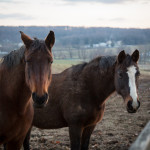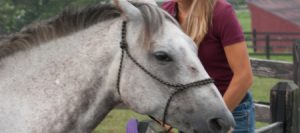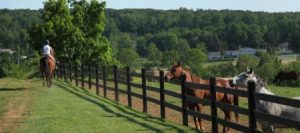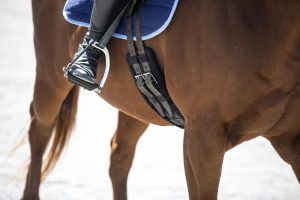 I want you to think back on a time when you or someone else was working with a horse and something just didn’t feel right about what was being done. The person wasn’t outright beating the horse, we all know that’s wrong, but you just had the feeling that whatever was being done wasn’t ethical, and it wasn’t good for the horse in any sense. My intent for this article is to tell you to listen to those instincts. As horsemen and women who respect the horse as a conscious being, not a machine or a tool for human fun, it is our responsibility to be aware of what we do and watch our horses for signs of pain, fear, and discomfort, because the horse won’t always tell you.
I want you to think back on a time when you or someone else was working with a horse and something just didn’t feel right about what was being done. The person wasn’t outright beating the horse, we all know that’s wrong, but you just had the feeling that whatever was being done wasn’t ethical, and it wasn’t good for the horse in any sense. My intent for this article is to tell you to listen to those instincts. As horsemen and women who respect the horse as a conscious being, not a machine or a tool for human fun, it is our responsibility to be aware of what we do and watch our horses for signs of pain, fear, and discomfort, because the horse won’t always tell you.
I believe there are several reasons why a lot of mainstream horse training has become “stuck in its ways”, and why many good hearted people unknowingly use training or handling tactics that are painful and even abusive to the horse.
Let’s compare dog training to horse training. I would make the argument, from personal experience, that the idea of positive reinforcement is much more widely accepted and used in dog training circles. In horse training, on the other hand, it is typically not well understood, and some horse trainers will immediately dismiss positive reinforcement as ineffective and coddling. Could one of the reasons be that dogs express pain quicker than horses?
There could be a number of reasons why painful training equipment and abusive tactics continue to be used by many riders and trainers, but is it possible that one of the main reasons people have not taken a second look at some “bad” methods is that the horse is silent? Think about it – what happens if you walk up to a dog and kick it in the stomach? The dog will yelp – most dogs have no problem making noise and letting you know when something hurts. Now walk up to a horse and yank on his bit. (and to be very clear here – yanking a bit causes physical pain to a horse (even a “hard-mouthed” horse), if he can feel a fly on his lips he can sure as heck feel that bit hitting his tender tongue and gums.) But does the horse make a sound? No, he probably throws his head up, but he won’t usually make any noise. Can you imagine if horses shrieked or yelped every time a bit was yanked in their mouths, a spur dug into their side, or a chain tightened across their nose? Perhaps there would be more awareness of how harsh some training tools and methods really are.
I recently reviewed a book on my product reviews site called Animals in Translation by Temple Grandin. It was an excellent book on animal behavior and in one particular section, Temple made this same point and also gave it a more scientific backing. Horses are prey animals, therefore they instinctually do not want to draw attention to themselves. Predators, on the other hand, don’t care if other animals know they are nearby. They will yelp and yowl and sometimes be big sissys about pain, where a prey animal knows that to survive, it must put on its poker face and not make a sound. In the wild, a sick or injured animal will be the first to be picked off by a predator, so prey species have learned to remain silent and stoic.
We must take greater care to recognize pain in our horses – look at their eyes and the tightness around their faces, and be aware of that instinctual “this isn’t right” feeling we get when something just doesn’t seem ethical.
My point with this article is not to claim that I never let the butt end of my lead rope or my stick connect with one of my horses if they show dangerous behavior or need more motivational pressure, but physical pain is not the intent, and I strive to be very aware of everything I do and the horse’s reaction to it. I believe that the real problem is that a lot of pain, both physical and emotional, is afflicted on horses, without the person really understanding what they are doing and how it truly affects the horse.
Food for thought, anyway. Your opinion?














17 Responses
Very eye opening points! I especially liked the insight about predator vs. prey reactions to pain. It will cause me to look at my horse differently from now on! I would venture to make the observation that in most cases the person either hurts their horse out of fear or lack of knowledge (as you stated). And there is definitely the “why fix what isn’t broken” mentality with horse training. If you are getting the horse to do what you need it to then why look for a better way? To me, that mentality boils down to ignorance or stubbornness on our end. Unfortunately, both could be negatively affecting our horses.
Good point about fear too. People expect to have more control of a horse than of the family dog. A horse is larger and for that reason, more intimidating to a lot of people than a dog is. People also don’t ride their dogs, and the general obedience desired from a family pet is a lot less than a 1000 lb animal they are going to be riding on top of. This greater desire for control leads to perhaps a little more tolerance for whatever methods it takes to achieve that control.
Your comments and thoughts are right on target. The worst fall I ever had was the result of me following the trainers instruction when my own intuition told me that the horse was still to scared to do what she ask of us! Since then I have always listened to the HORSE FIRST!!!
“The worst fall I ever had was the result of me following the trainers instruction when my own intuition told me that the horse was still to scared to do what she ask of us!”
— Felt the same way. My gut told me “don’t do it”, but I gave in and did what was expected of me. Since then I have titanium in my arm. I’ll never do anything again where my gut feeling says “bad idea, we are not ready yet.”
Hi Callie, Thank you for explaining how horses can’t show you how they are feeling. I have always found handling horses either too hard too soft. I’ve learned when a horse does something very wrong, you need to let them know it. Since adopting my rescued Arabian I’ve found that she bolts on a spook. When she did this twice to me, I took her out to the round pen and forced her to go around by grabbing her haler and making her walk both ways, then back up. I know I was actually scaring her instead of teaching her anything. That will never happen again. I lost some of the trust we had gained. She is moving to a farm where there is a trainer that can help me and her. Wish me and my Fancy luck. Thank you sincerely for sharing your excellent knowledge in such an easy low key way.
Hi Callie,
Thank you for this fantastic post. This subject is near and dear to my heart as I have experienced and acted on this “gut instinct” in regards to horse training and sometimes faced opposition for standing up for the horse. My first encounter with this was as a child taking riding lessons with my pony. One day while I was tacking up, my instructor advised me to knee my pony in the belly just before pulling the girth up. She said some ponies puff up their bellies and this would keep him from doing that. I did not like this advice at all – not only had I never had any trouble girthing up my pony (admittedly, we mostly rode bareback!) but, more importantly, my pony was my best friend – there was no way I was going to do that to him. So I quit the lessons and went back to riding and playing in the fields independently with my pony Frisky. I was encouraged by some that I should always follow the instructor’s advice, but luckily my parents agreed with me and didn’t force me to continue lessons with that instructor. My parents, especially my Dad, instilled in me a great love and respect for animals. I have continued to follow my gut instinct when it comes to interacting with horses and have many instances when I disagreed with what the “expert” was recommending. Recently I moved my horse out of a training barn for this very reason – because my gut was telling me something wasn’t right. It’s always hard to stand up for what you believe, especially when all you have to back you up is a gut feeling and you are going against “expert’s” advice. And, as you say, horses have evolved and survived by being silent, so they don’t express their distress – by sound anyway. But, like you said, they do express distress in other ways and those are the clues we need to pay attention to and gauge our training by. Look at all the controversy with Rolkur – thank goodness some horse lovers are speaking out against that practice even though the “experts” had chosen to ignore/accept it! I’ve heard you say it before – horses cannot learn while in a heightened state of fear or distress – that’s why I love your material – keep up the great work and thanks for this very important post!
This is so well said, and definitely made me look deep within myself. I’ve seen so much subtle abuse, like jerking on the bit, poking the spurs instead of rolling them, the use of over-under whips in gymkhana events, or the crop while jumping, and it breaks my heart to know our lovely horses will not holler at us that it hurts. We all need to take a step back and listen more carefully. Thank you so much for this enlightening post.
Hi Robynne, This thought always makes me step back and look within as well. Ignorance is not bliss, and I am glad we are all looking for a better way!
I agree! Something as key as bit choice may change when we consider avoidance of negative reinforcement and try to refine ourselves instead of opting for a potentially ‘faster’ solution. If we slap a leverage bit on a horse who’s developing a hard mouth it may solve the immediate problem, but what will it do for the real problem? Might it not be better to refine our own cues instead? You’d have to patiently work with the horse and both of you would have to re-learn from each other but the final reward would be improved communication and a better relationship. I hope I said this right.
Very well said!
Imagine the deafening din that would happen at horse shows if horses screamed like dogs when they felt pain????
Wow, what a great point Susan. Margaret
That is a great point. It is always the most interesting to me to go to the back rings at horse shows and watch riders and trainer warming up when no one else is around. It says a lot.
Great article. This maybe one of the most enlightening facts of horses that I have ever read. Wow! Really makes you think.
Hi Lorie, Thank you!
Hi Callie. Just found this post. I ride spend two days a week at a riding school doing volunteer yard work and ride on each day. Love it! However, my heart breaks for a particular horse. A seven year old 15.2 cob who was recently sold but on a working livery basis. His new owner turns up one day a week to bathe then ride him and that’s all! When I and others began riding him he used to be beautifully sensitive to our aids but is now hard work and looks so sad the whole time. I and my friends are so worried about him as we can see his spirit diminishing. Two days a week I give him special time, groom him, touch him, tell him he is beautiful and loved and try to spend quiet, calm time with him. His eyes close, he sighs deeply and rests his head into my chest. He is not my horse so I have to be respectful of his owner but my heart breaks for this beautiful boy. Anything else I could do to help him please Callie?
.
Hi Yvonne,
I believe it sounds as though you are doing all you can..